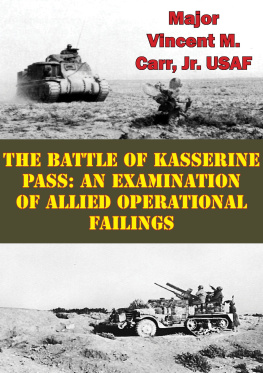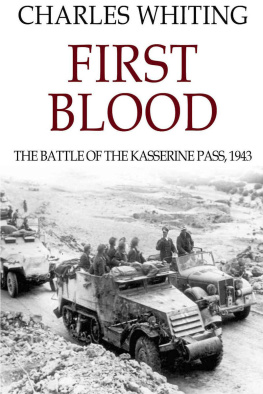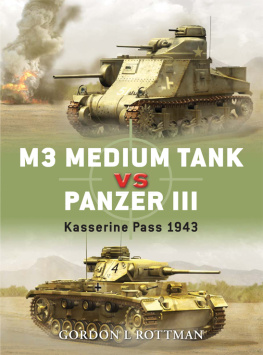This edition is published by PICKLE PARTNERS PUBLISHINGwww.picklepartnerspublishing.com
To join our mailing list for new titles or for issues with our books picklepublishing@gmail.com
Or on Facebook
Text originally published in 2003 under the same title.
Pickle Partners Publishing 2014, all rights reserved. No part of this publication may be reproduced, stored in a retrieval system or transmitted by any means, electrical, mechanical or otherwise without the written permission of the copyright holder.
Publishers Note
Although in most cases we have retained the Authors original spelling and grammar to authentically reproduce the work of the Author and the original intent of such material, some additional notes and clarifications have been added for the modern readers benefit.
We have also made every effort to include all maps and illustrations of the original edition the limitations of formatting do not allow of including larger maps, we will upload as many of these maps as possible.
THE BATTLE OF KASSERINE PASS: AN EXAMINATION OF ALLIED OPERATIONAL FAILINGS
by
Vincent M. Carr, Jr., Major, USAF
TABLE OF CONTENTS
Contents
Preface
This research grew out of recent efforts of my wife and my mother-in-law to retrace the steps of Captain Ernest C. Bucky Hatfield, my wifes grandfather, in his World War II experience. I have always had a keen interest in studying the Second World War, but when I had an opportunity to read Buckys diaries, many of which have dirt stains from the North African desert imbedded in their pages, it put a very personal touch on what I had only read in secondary sources before. My intention in these pages is to use these first-hand accounts from the 1st Armored Division in North Africa along with other sources to build a picture of why the Americans failed at Kasserine Pass when they began their operations in that theater with such high expectations.
I would like to acknowledge the assistance of the Air University Library Staff for their expertise and desire to make resources as readily available as possible. In addition, Id like to thank Chris Donnorummo for providing me access to her fathers personal diaries, photos, and other personal mementos to aid in my research. Likewise, I appreciate the assistance of Dr. Richard Muller in reviewing the paper and providing timely and insightful feedback to improve the quality. Finally, I would also like to thank my wife, Michele, for her dogged determination to keep me on track with the project, as well as for giving me the idea of using her grandfathers experiences to work on a unique research paper. I wish Id had the opportunity to know Bucky and speak to him personally about his experiences, but unfortunately I never had that chance. It is to him and other veterans of the greatest generation that I dedicate this paper.
Abstract
The Battle of Kasserine Pass proved to be a shock both to American military forces in the field and to the American public at home. The defeat of the Allied forces in the battle put doubt into the minds of manyall of whom assumed the righteous democracies of the western Allies could not be defeated in the field by the armies of Fascism. The defeat suffered by the Allies had nothing to do with right versus wrong, however, but was very much a product of a number of operational shortcomings on the part of the Allies. Poor logistics, failures on the part of American leadership, lack of unity of effort on the part of the Allies, the lack of combat experience, and inferior equipment all combined to contribute to the failure at Kasserine. Despite the setback at Kasserine Pass, the Americans proved quick learners, and applied the lessons of the North African experience to the remainder of their campaign in the European theater.
The Battle of Kasserine Pass
The series of engagements in and around the Kasserine Pass in Tunisia marked the first time American forces engaged in full-scale combat against German forces in the Second World War. As they entered the campaign, the general feeling among the Americans was one of great confidence in their ability to rapidly defeat the Axis forces arrayed before them in the North African desert. A recent study argues, the American military had been animated mostly by can-do zeal and a desire to win expeditiously; these traits eventually would help carry the day, but only when tempered with battle experience and strategic sensibility.
Introduction
In combat encounters comprising the Battle of Kasserine Pass, German and Italian troops drove French and American soldiers from the Eastern Dorsale mountain range fifty miles across the Sbeitla Plain to the Western Dorsale, where the Allies stopped the attack and prevented the Axis from expanding a tactical triumph into a strategic success.
Using personal papers and reflections of Captain Ernest C. Hatfield, U.S. Army, as a primary source, this study will analyze the Battle of Kasserine Pass from an operational perspective to determine why the Allied forces were dealt such a defeat. Specifically, this essay will examine operational aspects of the battle and the North African campaign to include: logistics issues, failures on the part of the Allies to adhere to principles of war, problems with the use of intelligence information, and general failings on the part of various American and Allied military leaders throughout the theater of operations. Additionally, the essay will briefly discuss how this defeat, combined with experiences throughout the Tunisian campaign proved to be a great learning laboratory, providing invaluable lessons for prosecuting the war in Europe.
Figure 1 Allied Landing Sites for Operation Torch
(Source: Anderson, Charles R. The U.S. Army Campaigns of World War II: Tunisia. World War II Commemorative Campaign Brochures. U.S. Army Center of Military History. On-line. Internet, 1 March 2003. Available from http://www.army.mil/cmh-pg/brochures/tunisia/tunisia.htm .)
Background
To justly analyze the Battle of Kasserine Pass, it is first necessary to place the battle in the larger context of the Allied campaign in North Africa. For the Americans, the war in North Africa began on November 8 1942 with the execution of the invasion plan for Operation Torch. On November 8, three Allied task forces, whose objectives were to seize Morocco, Algeria, and Tunisia, invaded French North Africa. Allied forces for the operation consisted of three separate task forces: the Western Task Force which was to land on the coast of Morocco, near Casablanca; the Central Task Force landing in Algeria, had the seizure of Oran as its primary objective; and, the Eastern Task Force which was to land near Algiers. Meanwhile, as these Allied forces landed in northern and western Africa, the British Eighth Army was driving from Libya in the east, pushing Rommels Panzer Army before it. The Allies hoped to catch and destroy these forces between the two advancing armies.
From Torch to Tunisia
The objectives of Operation Torch were not simply military in nature, as planning for the operation had been rife with political gamesmanship among the leaders of the Allied nations. The decision to invade North Africa reflected the triumph of British strategic arguments over those of the Americans as the Americans were pushing for an invasion in northern France as early as 1942.
As the operation began, the Americans and British hoped the French would not resist the Allied landings, and further expected French forces in North Africa would rejoin the anti-Axis alliance. In order to facilitate these hopes, the Allies designated General Dwight D. Eisenhower to command the invasion forces. With an American general leading the forces, the Allies sought to restrict any resistance from Anglophobic French officials and officers in the areas around the invasion beaches and ports.














